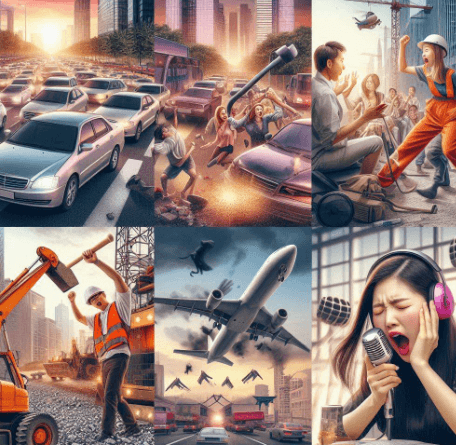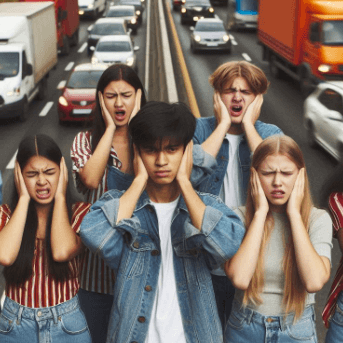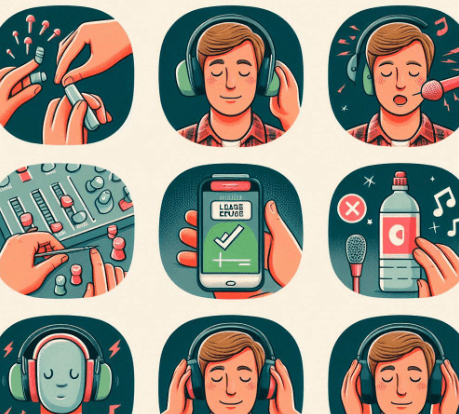Noise pollution may not be something you think about much, but it’s all around us. It’s the unwanted or harmful sounds from cars, construction, loud music, and even schools. This kind of pollution can affect your quality of life, and most importantly, your hearing health.
Noise pollution happens when sounds are too loud or constant, making them annoying or harmful. Picture a bustling city street, with honking cars, shouting pedestrians, and construction work. That’s noise pollution. The same goes for places like a rock concert or even a loud school cafeteria.
Talking about noise pollution is important because it doesn’t just affect our ears. It can mess with our sleep, stress levels, and even concentration. But today, we will focus on how it affects hearing health.
How Noise Pollution Affects Hearing Health?
Ever wonder how your ears pick up sound?
Inside your ear, there are tiny hair cells that pick up vibrations and send signals to your brain. When noise is too loud or constant, these delicate hair cells can get damaged. Once they’re hurt, they don’t grow back. That’s permanent hearing loss right there.

Both short-term and long-term noise exposure can mess with your hearing. Short bursts of loud noise, like fireworks, can cause temporary hearing loss or ringing in the ears.
Constant exposure, like living next to a busy road, causes gradual hearing loss over time. It’s sneaky and slow, so you might not even notice it at first.
Noise pollution affects anyone and everyone, but the impact varies. Babies, teens, and older adults are particularly at risk. Kids and teens, with their love for loud music and video games, might face early hearing issues if they’re not careful.
According to the American Speech-Language-Hearing Association , over 20 million Americans are working, playing, and living around environmental noise that is dangerously loud.
Because our ears are super important, taking care of them should be a priority for everyone.
Recommended Reading: Understanding the Different Types of Hearing Loss
The Reality of Noise Pollution Impact
Meet Jake, a high school senior who loves blasting music through his headphones. After months of cranking up the volume, he started noticing a ringing in his ears. That’s tinnitus, a common sign of hearing damage caused by loud noise. Jake now keeps the volume down to protect his hearing.

Studies show that about 1 in 5 teens already experience some level of hearing loss due to noise pollution. That’s a big number, and it’s growing.
Whether it’s concerts, video games, or even noisy classrooms, teens are at risk. Hearing loss can affect anyone, but it’s hitting our generation hard.
Think this only affects older adults? Think again.
Even younger kids face risks. Noisy toys and loud school environments contribute to early hearing damage. Imagine going through school with hearing difficulties. It’d make learning and socializing a whole lot tougher.
It’s not just about individuals either. Entire communities suffer. Constant exposure to traffic and industrial noise affects everyone in the neighborhood. It’s a public health issue that needs attention. By sharing stories and statistics, we can understand how serious the problem is and motivate action.
How To Prevent Noise-Induced Hearing Loss
Protecting your hearing doesn’t have to be complicated. Small steps make a big difference.
One of the simplest things you can do is use earplugs in noisy places like concerts or construction sites. They might look a bit uncool, but your ears will thank you later.
Another easy fix is to keep the volume down. Whether you’re listening to music or watching TV, don’t crank it up to the max. Many devices even have settings that alert you when the volume is too high. Use them!

Regular hearing check-ups are key, especially if you’re often in loud environments. Catching any issues early can prevent bigger problems down the road. Make it a habit, like your annual physical or eye exam.
There are also some cool apps and gadgets out there that can help monitor noise levels around you. These can be super handy for figuring out when you’re in a risky sound zone. They’re like mini guardians for your ears.
Think about making your living space quieter too. Use rugs and curtains to absorb sound and keep your windows closed during rush hour. Small changes at home can create a more peaceful environment and protect your hearing.
Promoting Awareness and Advocacy
Talking about noise pollution and its effects on hearing health is super important. Spreading the word can help others understand the risks and change their habits. Share what you’ve learned with friends and family. It might just save their hearing too.
Communities can take action by advocating for quieter environments. Whether it’s pushing for stricter noise regulations or creating quiet zones in busy areas, these efforts matter. Everyone has a role to play in making our surroundings less noisy.
Healthcare professionals, like pharmacists, can be great allies in this fight. They can provide advice on hearing protection and share information on the impacts of noise pollution. Next time you drop by the pharmacy, ask for tips on keeping your ears safe.
Schools can also get involved by educating students about the importance of hearing health. Programs and workshops can make a big difference in how young people approach noise and hearing protection.
Public awareness campaigns are another powerful tool. Posters, social media, and community events can grab attention and spread important information. Raising awareness at every level helps build a culture of hearing protection.
Taking Action for Better Hearing Health
Wrapping things up, it’s clear that noise pollution is a big deal for our hearing health.
Understanding the risks and knowing how to protect our ears can make a world of difference. Remember, your hearing is something you can’t easily fix once it’s damaged.
Take action now.
Use earplugs, check out Amazon for some of the best earplugs. keep the volume down on your devices, and get those regular hearing check-ups.
These small steps can save you from a lot of trouble down the road. And don’t just keep this info to yourself—share it with your friends, family, and anyone else who’ll listen. Spread the word and help others protect their hearing too.
If you’re looking for more info or need help, don’t hesitate to reach out to me.
I created this site to talk not only about tinnitus, but other ear-related issues as well.
And if you’re ever worried about your hearing, go see a specialist. It’s always better to be safe than sorry.
So, let’s all do our part in creating a quieter, healthier world.
Whether it’s through personal actions or community efforts, every little bit helps. Protect your hearing today for a sounder tomorrow.
Feel free to leave any questions or comments that you may have below.
Looking forward to hearing from you
Regards
Roopesh

Thank you for shedding light on the critical issue of noise pollution and its impact on hearing health! I had no idea that 1 in 5 teens already experience some level of hearing loss due to noise pollution – that’s alarming! Your suggestions for preventing noise-induced hearing loss are practical and easy to implement, such as using earplugs and keeping the volume down. I appreciate your emphasis on promoting awareness and advocacy, too. It’s crucial that we take action to protect our hearing health, not just individually but also as a community. Let’s work together to create a quieter, healthier world!
Hey Cryril
You are most welcome. Thank you so very much for stopping by and leaving us a comment. I am looking forward to chatting with you again.
Regards
Roopesh